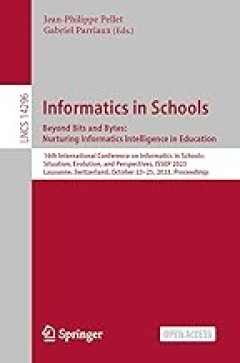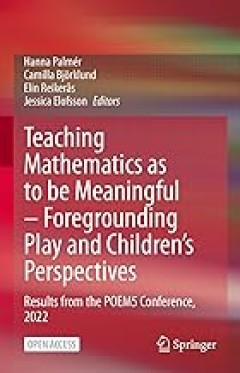Filter by

Tourism and Conservation-based Development in the Periphery
This open access book applies a social ecological systems (SES) lens to conservation-based development in Patagonia, bringing together authors with historical, contemporary, and future-oriented perspectives in order to increase understanding of the social and environmental implications of nature-based tourism and other forms of conservation-based territorial development. By focusing on Patagoni…
- Edition
- -
- ISBN/ISSN
- 978-3-031-38047-1
- Collation
- XXXIV, 468
- Series Title
- -
- Call Number
- -

Reconstructions of Gender and Information Technology
This open access book explores what makes women decide to pursue a career in male-dominated fields such as information technology (IT). It reveals how women experience gendered stereotypes but also how they bypass, negotiate, and challenge such stereotypes, reconstructing gender-technology relations in the process. Using the example of Norway to illuminate this challenge in Western countries, t…
- Edition
- -
- ISBN/ISSN
- 978-981-99-5186-4
- Collation
- XV, 133
- Series Title
- -
- Call Number
- -

Ins Philosophieren finden mit Kürzesttexten
Das vorliegende Open-Access-Buch zeigt, wie Kinder im Grundschulalter auf philosophische Gedanken reagieren. Diese werden den Kindern in Form von Kürzesttexten dargeboten. Auf Veranschaulichungen wird bewusst verzichtet. Dieser Zugang zum Philosophieren erscheint ungewöhnlich, wird doch in der Regel beim Philosophieren mit Kindern auf anschauliche Zugänge zurückgegriffen. Es zeigt sich jedo…
- Edition
- -
- ISBN/ISSN
- 978-3-662-67978-4
- Collation
- XIII, 442
- Series Title
- -
- Call Number
- -

Fortbildungen für KulturSchule
In diesem Open-Access-Buch gibt eine Evaluationsstudie Auskunft, wie teilnehmende Lehrkräfte Fortbildungen erleben, die auf die KulturSchul-Entwicklung zielen. Welche Perspektiven bauen diese auf? Und welche internen Unterstützungsmaßnahmen trifft die Schule, damit sich die Lernkultur ändern kann? Die Fortbildungsreihen im Landesprogramm «KulturSchule Hessen» legen die Grundlage dafür…
- Edition
- -
- ISBN/ISSN
- 978-3-658-42220-2
- Collation
- XI, 243
- Series Title
- -
- Call Number
- -

Informatics in Schools. Beyond Bits and Bytes: Nurturing Informatics Intellig…
This book constitutes the proceedings of the 16th International Conference on Informatics in Schools: Situation, Evolution and Perspectives, ISSEP 2023, held in Lausanne, Switzerland, during October 23–25, 2023. The 14 full papers presented in this book were carefully reviewed and selected from 47 submissions. They are organized in four topical sections named: artificial intelligence and i…
- Edition
- -
- ISBN/ISSN
- 978-3-031-44899-7
- Collation
- XX, 195
- Series Title
- -
- Call Number
- -

Die Methode der didaktisch orientierten Rekonstruktion
In diesem Open-Access-Buch systematisiert Judith Huget in einer theoretischen Herangehensweise eine stoffdidaktische Methode - die didaktisch orientierte Rekonstruktion - zur Ausdifferenzierung von Wissenselementen von Lehrkräften. Anhand dieser Methode werden anschließend exemplarisch Fachwissenselemente für Lehrkräfte am Beispiel des empirischen, schwachen und starken Gesetzes der großen…
- Edition
- -
- ISBN/ISSN
- 978-3-658-42641-5
- Collation
- XVI, 227
- Series Title
- -
- Call Number
- -

Sinnbilder des Alltagsverstandes
Das vorliegende Open-Access-Buch folgt der übergreifenden Fragestellung, ob ein Kritiklernen im institutionell gebundenen politischen Unterricht möglich ist. Diese Fragestellung wird nicht aus einer institutionen- und schulsoziologischen, sondern aus einer lerntheoretischen und politikdidaktischen Perspektive entwickelt. Der Analysefokus richtet sich damit auf die Frage, wie subjektorientiert…
- Edition
- -
- ISBN/ISSN
- 978-3-658-42257-8
- Collation
- XII, 228
- Series Title
- -
- Call Number
- -

Postdigital Participation in Education
This open access book examines the interrelations and correlations of the postdigital condition and its relationship to education, with a particular focus on participation. Contributions reflect on how educational institutions are affected by the recent transformations of media technologies and practices, and how at the same time institutions such as schools and universities are supposed to ena…
- Edition
- -
- ISBN/ISSN
- 978-3-031-38051-8
- Collation
- XXV, 250
- Series Title
- -
- Call Number
- -

Future Intelligence
The first quarter of the 21st century introduced the world to rapid uncertainty, be it the social-political and financial crises, or pandemics, or the shaking up of well-established democracies with an increasing rise in populism. At the same time, the technological promise has taken off with automation, artificial intelligence, and nanotechnologies increasingly becoming an economic reality. Th…
- Edition
- -
- ISBN/ISSN
- 978-3-031-36381-8
- Collation
- XXII, 241
- Series Title
- -
- Call Number
- -

Teaching Mathematics as to be Meaningful – Foregrounding Play and Children�…
This open access book’s theme is Teaching mathematics as to be meaningful – foregrounding children’s play and perspectives. It discusses the relation between teachers, children and mathematical content within the context of play with a particular focus on the framing of these relations within this context, which is an important theme in the debate on whether teaching should be integrated …
- Edition
- -
- ISBN/ISSN
- 978-3-031-37662-7
- Collation
- XII, 260
- Series Title
- -
- Call Number
- -
 Computer Science, Information & General Works
Computer Science, Information & General Works  Philosophy & Psychology
Philosophy & Psychology  Religion
Religion  Social Sciences
Social Sciences  Language
Language  Pure Science
Pure Science  Applied Sciences
Applied Sciences  Art & Recreation
Art & Recreation  Literature
Literature  History & Geography
History & Geography